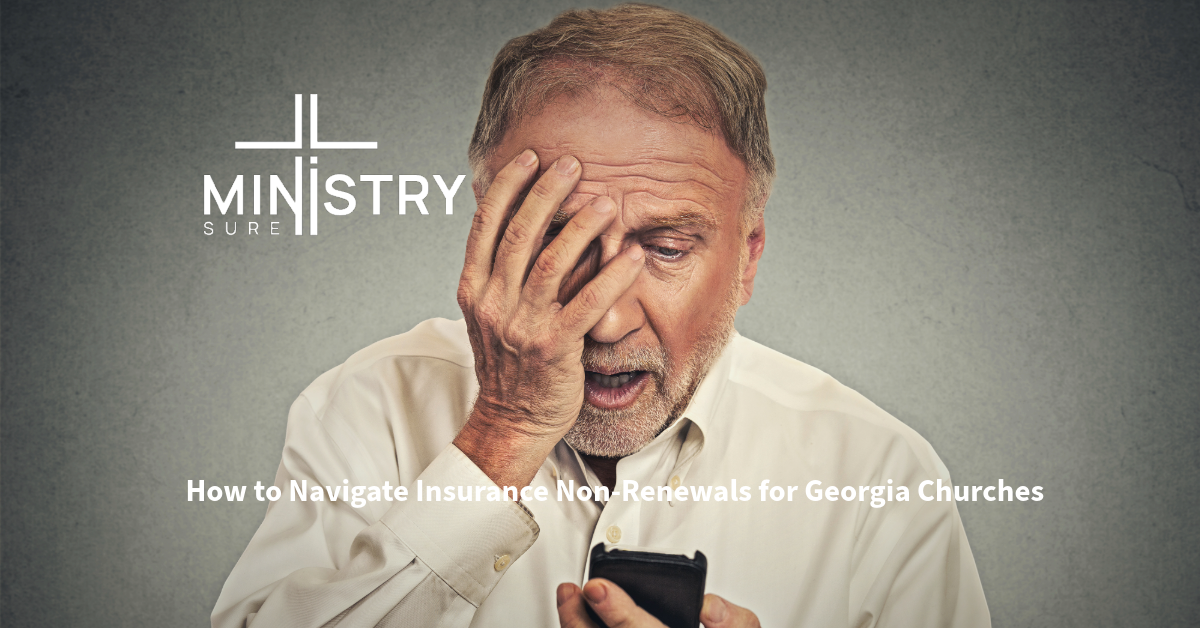
Church insurance policies offer financial protection against potential issues such as property damage, bodily injury, natural disasters, or other unforeseen circumstances like cyber attacks. Insurance non-renewals can present a huge problem, as they leave your church unprotected.
For churches in Georgia, these policies prove critical for peace of mind, ensuring that the church can continue its operations and serve its community despite unexpected setbacks.
Insurance carriers/insurance providers are the companies that underwrite and issue these policies. Selecting the right carrier is important for churches as each insurer has unique offerings and specializations, which could include tailored coverages for religious institutions for a variety of insurance costs.
When dealing with insurance companies, your church governing body needs to understand that they are the entities responsible for backing the insurance policies provided by the carriers, processing claims, and ensuring that covered losses are compensated in accordance with the policy terms.
Understanding the differences and the roles of insurance policies, carriers, and companies helps in navigating renewals and providing consistent coverage for your Georgia-based church.
Dealing with Insurance Non-Renewals
When a Georgia church faces a non-renewal notice from its current insurance provider, it can be an unsettling and confusing time for the congregation’s leadership.
Understanding insurance non-renewals requires a strategic approach to continue the protection for the church’s property, operations, and community. Understanding the causes, managing potential coverage lapses, and identifying viable alternatives are critical steps in this process.
The Reasons Behind Insurance Non-renewals for Churches
Several factors can lead to the non-renewal of a church’s insurance policy:
- Claims History: A history of frequent or severe claims can prompt an insurance carrier to decide not to renew a policy.
- Changes in Insurance Company‘s Focus: Sometimes insurance companies alter their risk profiles or strategy, opting to serve different markets.
- Regulatory Changes: Changes in the insurance regulatory landscape can make certain policies or coverages untenable.
- Property Conditions: Issues such as outdated electrical wiring or structural concerns can increase risks and lead to non-renewals.
- Location Factors: Churches in areas prone to natural disasters might be deemed too high-risk.
By pinpointing the specific reasons behind a non-renewal, a church can take targeted actions to address the issues or look for providers more aligned with their situation.
Claims History
Insurance carriers assess risk based on various factors, including claims history. If a church has a track record of multiple claims or claims of significant value, it can be seen as a higher risk. This may prompt the insurance company to decide not to renew the policy.
To address this issue, it is essential for churches to identify trends in their claims history and take proactive steps to mitigate risks. This may include implementing safety protocols and training programs to prevent accidents and injuries, conducting regular inspections to identify potential hazards, and promptly addressing any issues that arise.
Changes in Insurance Company‘s Focus
Changes in an insurance company’s focus can also lead to non-renewals for churches. Insurance carriers may shift their priorities and specialize in different lines of coverage, choosing to no longer offer coverage for churches or religious institutions. This can be due to changes in the company’s business strategy or a shift in their risk appetite.
To address this issue, churches should stay proactive in monitoring their insurance carrier’s focus and any changes in their offerings. Regular communication with the insurer and staying informed about the industry trends can help identify potential non-renewal risks ahead of time.
Regulatory Changes
In the ever-evolving insurance industry, regulatory changes can have an impact on insurance carriers and their offerings. These changes may include new laws, regulations, or requirements set forth by state or federal governing bodies.
For Georgia churches, it is crucial to stay updated on any regulatory changes that may affect their insurance policies. This requires proactive monitoring and regular communication with the insurance carrier. By staying informed about industry trends and participating in relevant workshops or seminars, church leaders can identify potential non-renewal risks ahead of time.
When regulatory changes arise, it is important for churches to assess how these changes may impact their insurance coverage. This can involve reviewing policy terms, limits, exclusions, and any additional coverages required to comply with new regulations.
If your insurance carrier is unable to adapt to these regulatory changes or if they decide to shift their focus away from churches, it may result in a non-renewal notice. In such cases, it becomes necessary for the church to explore alternatives to ensure continued coverage.
Property Conditions
Insurance carriers consider the condition of the church’s property when deciding whether or not to renew a policy. If the carrier determines that the property has deteriorated or poses a greater risk, they may choose not to renew the policy.
To avoid insurance non-renewals due to property conditions, churches in Georgia need to prioritize regular property maintenance and upkeep. Conducting routine inspections, addressing any issues promptly, and making necessary repairs or upgrades can go a long way in maintaining a safe and insurable property.
Keeping detailed records of property maintenance and improvements can also help demonstrate to insurance carriers that the church is proactive in mitigating risks. These records can show that the church has taken steps to minimize potential claims and damages.
Location Factors
Location factors can also play a significant role in insurance non-renewals for Georgia churches. Insurance carriers assess the risk associated with the location of the church building to determine the likelihood of future claims. Some location factors that could influence non-renewals include:
-
Natural Disasters
Georgia is prone to various natural disasters, such as hurricanes, tornadoes, and flooding. If a church is located in a high-risk area, insurance carriers might be hesitant to renew the policy due to the increased likelihood of property damage.
-
Crime Rate
The crime rate in the surrounding area can also affect insurance non-renewals. If the church is situated in a neighborhood with a high crime rate, insurance carriers may be concerned about theft, vandalism, or other property-related crimes.
-
Proximity to High-Risk Facilities
If a church is located near facilities that are considered high-risk, such as chemical plants or busy highways, insurance carriers may perceive the church as having an increased risk of accidents or incidents that could result in property damage or liability claims.
-
Building Age
The age of the church building is another factor that insurers consider when deciding whether to renew a policy. Older buildings may have outdated electrical systems, plumbing, or structural issues that increase the risk of property damage or accidents. Churches with older buildings should invest in regular inspections and necessary upgrades to demonstrate to insurers that they are actively mitigating risks.
-
Accessibility
The accessibility of the church building is also taken into account by insurance carriers. If the location is difficult to access, particularly for emergency services, insurers may view it as a potential concern in the event of an accident or emergency. Churches located in remote areas or areas with limited emergency services may need to find alternative solutions or demonstrate their preparedness for such situations to avoid non-renewals
Additionally, it is important for churches to take proactive steps to mitigate any perceived risks that may affect their insurance renewals. Regular maintenance and inspections should also be conducted to address any safety concerns or building code violations.
Steps to Take When Facing a Lapse in Coverage
In the event of an impending lapse in coverage, the following steps are crucial:
- Communicate with Your Current Agent: Obtain a clear explanation for the non-renewal and see if there are any corrective actions that can reverse the decision.
- Begin the Search Immediately: Time is of the essence, so start looking for alternative coverage options right away.
- Review Your Church’s Insurance Needs: Re-evaluate your coverage requirements, making sure they reflect current operations and assets.
- Reach Out for Quotes: Contact multiple insurance companies or work with an independent agent who can obtain several quotes on your behalf.
- Understand the Terms: Carefully review terms of potential new policies to ensure there are no gaps in coverage that could leave your church vulnerable.
By actively managing the transition process, churches can mitigate the risks associated with a potential lapse in coverage.
MinistrySure Helps with Church Insurance Options
One valuable resource for churches navigating insurance non-renewals is MinistrySure. MinistrySure is a specialized insurance agency in Georgia that understands the unique needs of churches and provides tailored insurance options.
When facing a non-renewal, MinistrySure can assist churches in finding alternative coverage options that meet their specific needs. We have a network of trusted insurance carriers that offer comprehensive coverage for churches in Georgia. With our expertise and industry knowledge, we can help churches find insurance policies that address the risks associated with property damage, liability, and other potential hazards.
MinistrySure takes the hassle out of the insurance search process by doing the legwork for churches. We can gather quotes from multiple insurance carriers, ensuring that churches have a variety of options to choose from. This allows churches to compare coverage, terms, and insurance costs to make an informed decision about their insurance needs.
In addition to providing insurance options, MinistrySure offers guidance and support throughout the transition process. We can help churches and other nonprofit organizations understand the terms and conditions of insurance policies, ensuring that there are no gaps in coverage.
Our expertise can also help churches identify any potential risks or areas for improvement that may have contributed to the non-renewal, allowing your church to address those concerns and improve your chances of securing coverage in the future.





